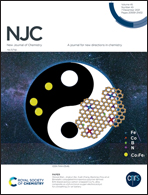Destabilization of Alzheimer's Aβ42 protofibrils with acyclovir, carmustine, curcumin, and tetracycline: insights from molecular dynamics simulations†
Abstract
Among the neurodegenerative diseases, one of the most common dementia is Alzheimer's disease (AD). The characteristic symptom of AD is the deposition and aggregation of amyloid-β-peptides in the neural tissue. A number of drug molecules have been suggested for dissolving and destabilizing the amyloid-β (Aβ) fibril. Antiviral drug acyclovir, antineoplastic drug carmustine, antibacterial drug curcumin, and antibiotic tetracycline are supposed to be potential drug molecules for treating AD. Many experimental studies suggest that these drugs can effectively be used as aggregation inhibitors but the underlying mechanism of inhibition of aggregates is currently unknown. In this study, a series of molecular dynamics simulations have been carried out in order to explain the underlying molecular mechanism of the destabilization of Aβ protofibrils by acyclovir, carmustine, curcumin, and tetracycline. It was found from our results that all these drugs bind to the interior of the hydrophobic grooves of Aβ protofibrils and caused destabilization of the β-strand of Aβ protofibrils. All these four drugs bind to the hydrophobic residues of Aβ protofibrils, which leads to the destruction of salt bridges between D23–K28 and causes the opening of two β-strands. These drugs are found to be effective in diminishing Aβ aggregations, and among these four drugs, tetracycline is found to be more effective in diminishing Aβ aggregations. The underlying molecular interactions of these drugs to inhibit Aβ aggregations may give some vision towards the approach of designing the structure-based drugs for AD.



 Please wait while we load your content...
Please wait while we load your content...